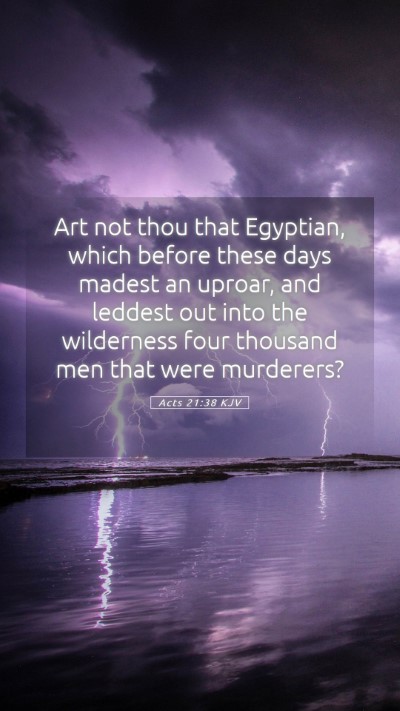Understanding Acts 21:38
In Acts 21:38, the apostle Paul finds himself in a tense situation where he is questioned by the Roman commander regarding his identity. The verse states:
"Art not thou that Egyptian, which before these days madest an uproar, and leddest out into the wilderness four thousand men that were murderers?"
Contextual Background
To fully grasp the meaning of Acts 21:38, it's essential to understand the historical and cultural context. Paul has returned to Jerusalem, a city rife with tension between Jewish beliefs and the burgeoning Christian faith. His mission has placed him in direct opposition to those who view him as a threat to their traditions.
Verse Analysis
-
Identity Confusion:
Paul is mistaken for an Egyptian revolutionary who had previously incited a violent mob. This reflects the precarious nature of Paul's situation in Jerusalem and highlights the risks associated with his ministry.
-
Roman Authority:
The Roman commander’s question underscores the authority of Roman governance in Jerusalem, revealing the intersection of politics and religion at the time.
-
Public Perception:
The accusation reveals how public perception can be skewed, especially in a charged political atmosphere. Paul, known for his teachings and missionary work, faces misrepresentation.
-
Foreshadowing Conflict:
The verse serves as a prelude to deeper conflicts that Paul will encounter, emphasizing the struggles he will face as a proponent of the Gospel amidst opposition.
Commentary Insights
The insights from various public domain commentaries elucidate the verse's meaning:
-
Matthew Henry:
Henry highlights the significance of Paul’s calmness in the face of misunderstanding. He reflects on the trend of mislabeling believers, and how this often leads to persecution.
-
Albert Barnes:
Barnes points out the implications of the Roman commander's question, noting how it indicates the level of unrest in Jerusalem and the heightened responsibility of authorities to maintain order.
-
Adam Clarke:
Clarke elaborates on the immediate implications of Paul's identity; he delves into Paul's past and the possible implications of being associated with a notorious zealot.
Applications of the Verse
Acts 21:38 invites readers to consider the challenges of understanding and interpreting Biblical messages amidst societal conflict. The lessons from this passage encourage believers to navigate their faith journeys with wisdom and discernment.
Reflection for Bible Study Groups
This passage can serve as a starting point in Bible study groups. Here are some discussion questions:
- How do we perceive others' identities based on public narratives?
- What can we learn from Paul's response to accusations?
- How does faith play a role in confronting misunderstandings?
Related Bible Cross References
- Acts 21:30 - The uproar in Jerusalem.
- Acts 22:22-23 - The response of the crowd to Paul's testimony.
- Acts 24:5 - Accusations against Paul as a leader of the sect.
Conclusion
Acts 21:38 not only provides a glimpse into Paul’s experience but also serves as a profound illustration of the complexities faced by those who live their faith openly. Through careful study of scripture, believers gain insight into their own lives, addressing questions of identity, conflict, and understanding in the modern world.


